#quantifiable goal
Text

Objectif chiffré
Les cartes sont sur @tire-une-carte / The cards are at @play-my-game
200 notes
·
View notes
Text


23 notes
·
View notes
Text
I read 42 books in 2023. That's counting novellas but not counting web serials, webcomics, manga, visual novels, glowfic, and so on, though there were some fuzzy judgment calls about which of those categories to count some things as.
I have a big list of things that I want to at some point get around to reading/watching/playing/whatever. I checked off 35 of them this year, and marked two others DNF (one after reading a couple dozen pages, one after reading more than 1.6 million words).
I'd like to beat both of those numbers in 2024. Also, I averaged 5875 steps a day this year. (As tracked by my phone, so this is below the true value.) Planning on beating that too.
And as previously mentioned, I'm starting a webcomic in the new year. I started 0 webcomics in 2023 (Male Captions is not a comic, as per Scott McCloud), so this involves beating a number too.
5 notes
·
View notes
Text
um. started collecting screenshots of bee and puppycat episodes. here’s my haul for Gentle Touch



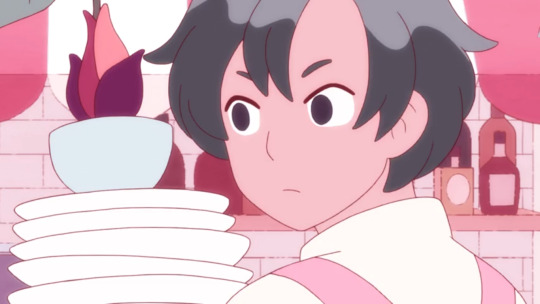



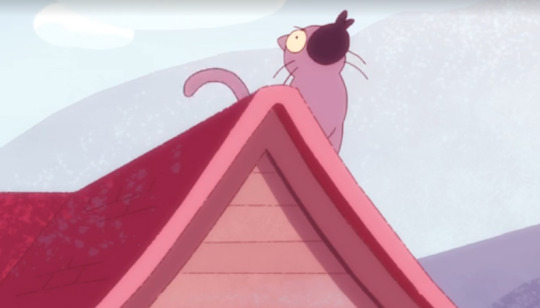
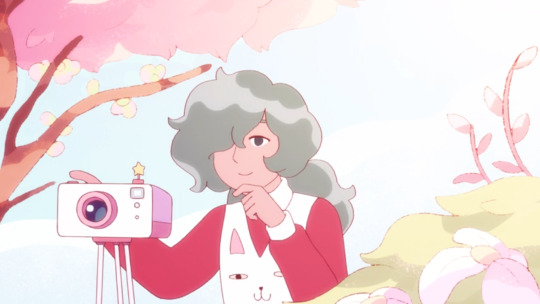


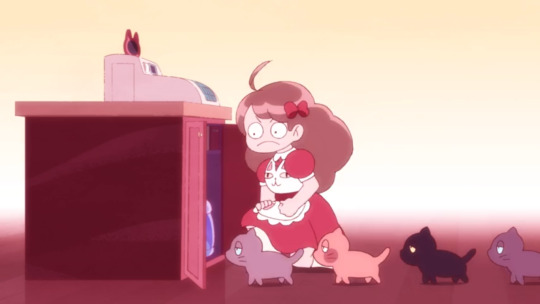
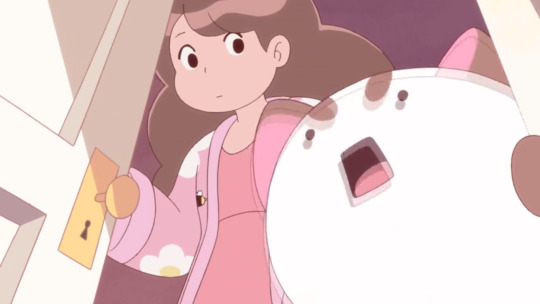








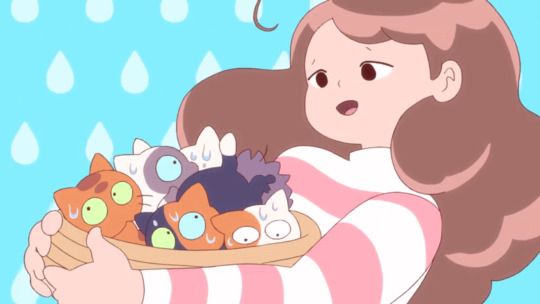


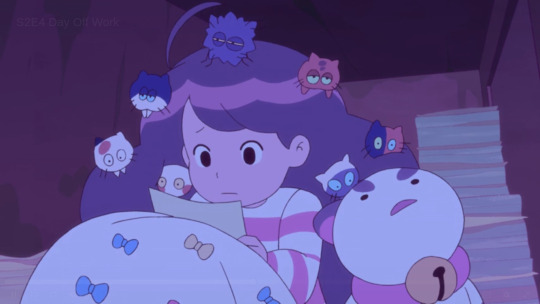


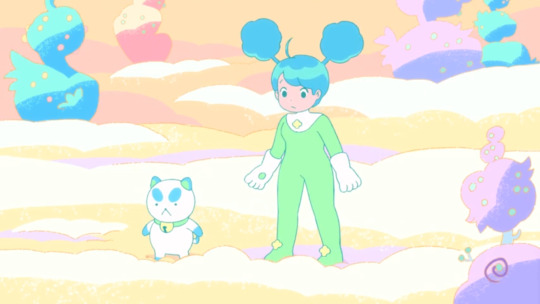
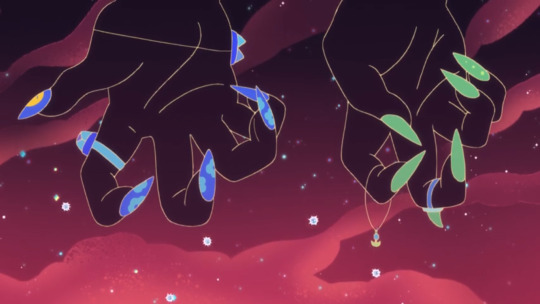
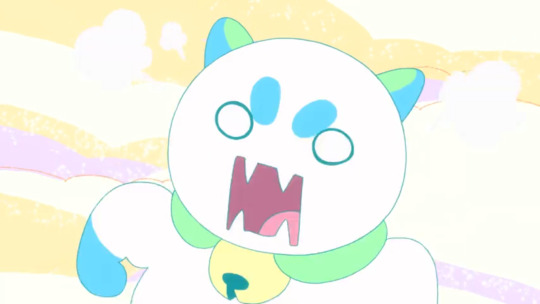


#bee and puppycat#bapc#bee and puppcat lazy in space#bapc lazy in space#i think i did well. at this task of my own creation. that has no quantifiable goals. or real purpose of any kind
28 notes
·
View notes
Text
Had a migraine earlier and got no work done, so I was planning on today just being a break day ....
But then around 10pm I decided to try to write a paragraph. Cut to 330 am and I have written 700 words (then deleted 200 of them as unnecessary). Which is ... good?
Arguably that net gain of 500 words might have gone quicker and smoother if I had waited until tomorrow and tackled it with a less tired brain, but who knows ¯\_(ツ)_/¯
Gonna go ahead and decide any progress is good progress, call it a win, and make myself try to go to sleep now!
#dissertation blogging#accountability#the whole revision process is frustratingly hard to quantify or estimate how long things will take#which makes it hard to talk about here as much or set accountability goals for myself#and I do not care for it frankly#but i am slogging along nevertheless
4 notes
·
View notes
Text
girls love to read 1000 page books and then be like damn why didnt i hit my goodreads goal :/
#im girls!#i havent set a target for 2023 and prolly wont cause perhaps reading goals cannot be easily quantified like that.....
6 notes
·
View notes
Text
.
#Ngl coming up with quantifiable & crossable goals on my bucket list for this year was a struggle compared to the previous year#2024 would have some major changes and thus goals#but 2023 is the year of continuation of previous goals and achievement#bucket list 2023#bucket list 2022#goals#bucket list
0 notes
Note
Hii douma! May I request Shoto just in love? Just him being in love for the very first time and the concept of love just so foreign to him? Have a great day/night!

MY HERO ACADEMIA MASTERLIST

The cold spring air of U.A. High School's training grounds swept across Shoto Todoroki's face, his distinctive heterochromatic eyes glancing stoically at the horizon. As he approached the courtyard, the brisk wind tousled his dual-toned hair, and for the first time, a peculiar sensation stirred within him. It was an emotion he hadn't experienced before, a feeling that seemed to thaw the icy demeanor that usually defined him, yet he couldn't put a finger on what was it.
As the son of Endeavor, emotions had never been a territory he explored willingly. However, this day would mark a shift, an unexpected twist in the stoic narrative of Todoroki's life.
Shoto was no stranger to intense emotions. Anger, resentment, and the relentless pursuit of self-discovery had been his companions for as long as he could remember. But this was different – a foreign concept that had invaded the carefully constructed fortress around his heart.
As he walked past the cherry blossom trees, their delicate petals swirling in the air, his gaze landed on a figure standing by the fountain.
It was you, a fellow classmate whose presence had recently begun to captivate him. You were a presence in his life that had begun to defy categorization. You were just a person — a puzzle piece that didn't quite fit the mold he'd grown accustomed to. He admired you from afar, appreciating your strength and determination in both academics and combat.
It began innocently, Shoto noticed. A shared glance across the classroom, a casual comment during training, and the casual camaraderie of shared laughter. But as days unfolded, the puzzle piece shifted, creating a mosaic he hadn't anticipated. He was no stranger to intensity; after all, his own quirk bore the duality of fire and ice. Yet, this newfound sentiment was a flame of a different kind, uncharted and unsettling.
"Hey," he called out, his voice surprisingly steady despite the internal turmoil.
You turned towards him, a quizzical smile gracing your lips. "Todoroki, hey. Is everything okay?"
Shoto hesitated, his usual calm exterior cracking just a bit. "I… I wanted to talk."
Curiosity sparked in your eyes as you nodded, inviting him to continue.
"I've been thinking," Shoto began, his usually concise words replaced by a rare vulnerability. "About feelings. Emotions. And there's something I can't quite comprehend."
You listened intently, sensing the gravity of Shoto's words. "What is it?"
"I've always been driven by my goals, my desire to surpass my limits, and the need to prove my father wrong," he continued, "but lately, I find myself caught in a different struggle. It's like a flame inside me, burning with an intensity I can't control."
You tilted your head, intrigued. "Oh?"
Shoto nodded, his gaze meeting yours with an intensity that surprised even himself. "It's a distraction, an enigma that I can't unravel. It's like standing at the edge of a precipice, uncertain of the fall," he admitted, a rare flicker of uncertainty crossing his features.
Your lips curled into a gentle smile. "Love, Todoroki. It sounds like you're in love."
Todoroki's brows furrowed, the word foreign on his tongue. Love. A concept he'd analyzed in textbooks but never expected to encounter firsthand.
You smiled gently, understanding the conflict within him. "Love is complex, Shoto. It's not something you can control or quantify. It's a force that binds us together, that makes us vulnerable and strong at the same time."
Shoto absorbed your words, his internal battle slowly subsiding. "I don't know how to navigate this unfamiliar territory."
You reached out, placing a reassuring hand on his shoulder. "It's okay not to have all the answers. Love is a journey, not a destination. Take your time, Todoroki."
"I think… I might be in love with you," he confessed, the admission hanging in the air like the delicate petals of cherry blossoms.
Your eyes widened, a subtle blush adorning your features. "Todoroki, that's…" you began, but he silenced you with a tender touch as he placed his hand to your rosy cheek.
"Let me finish," he whispered, his breath mingling with the soft evening breeze. "I might not fully understand it, but I know that being around you feels just right. I love spending my time with you, it doesn't matter if we just chat or study together."
A heartbeat passed between you, the air charged with unspoken emotions. And then, in a moment both tender and profound, Shoto leaned in, placing a gentle kiss to your cheek. It was a sweet, hesitant kiss, a step into the uncharted territory of love.
As he looked at you, the world around seemed to fade, leaving only the two of you in the quiet embrace newfound feelings. Shoto's stoic facade melted away, revealing a vulnerability.
A quiet moment passed before you chuckled, breaking the tension. "Well, that's unexpected. I never thought I'd be the one to thaw Todoroki's icy heart."
A small, hesitant smile tugged at Todoroki's lips. Embracing the vulnerability he rarely allowed himself to show, Shoto took a deep breath. "Would you mind if I… explore this feeling with you?"
"I'd like that, Shoto," you replied, reaching your hand out to intertwine your fingers with his.
#shoto todoroki x you#shoto todoroki x reader#shoto fluff#todoroki shouto#shoto todoroki#shoto x you#bnha x reader#shouto x reader#mha x reader#mha fluff#todoroki shoto x reader#shoto fic#shoto x reader#todoroki shoto#shoto x y/n#mha fic#bnha fluff#shouto x you#mha drabbles#anime fluff
462 notes
·
View notes
Text
I am just. SO fascinated by the core theme of dreams in One Piece as it pertains to Usopp. Everyone else has a dream that’s like…either very specific as a goal, very ambitious, or both (some at different levels of quantifiable than others). But Usopp’s simultaneously so simple and so unquantifiable. It’s not a hyperbole, like “bravest warrior of the sea”, for example. It’s just “brave warrior of the sea”. So straightforward. But like, how do you even declare that completed? At which point does Usopp look at himself and go: dream achieved! Because in that case, he’s already achieved it. He achieved it the second he stepped on the merry. He achieved it the second he was terrified scared during a fight and stayed to fight anyway. He achieved it the second he decided to fight everyone he loved because he thought they gave up on their ship. He achieved it the second he put on a mask and pretended to be someone else to be a hero.
The existence of Sogeking is so telling about this because like. He invents a persona in order to be a warrior and feel worthy enough to fight. But that’s still him under there. It seems like Luffy and Chopper aren’t the only ones fooled by the Sogeking persona, Usopp himself believes to an extent that that’s another guy, that’s the brave warrior of the sea he wants to be. But it’s still him!
So like. His journey is less about achieving the dream. It’s more about realizing that he’s already achieved it.
609 notes
·
View notes
Note
Hope this isn't an ask you get all the time, but how do you track your progress when you're doing editing?
Everyone talks about word goals, and that seems fine for a first draft, but doesn't make sense to me when it comes to revisions. Do you have any kind of system for setting daily goals for your revisions?
Actually, I don't think anyone's ever asked me about this. :) So no sweat.
Briefly: I think you're wise in not attempting wordcounting in this phase of dealing with an MS—or trying to push yourself into a structure so rigid. ...There's this, too: there's a whole lot too much emphasis out there at the moment on trying to force yourself into other people's writing and editing paradigms—so many of them riddled with bar graphs and "demonstrable" daily progress. You need to find what works for you. More words dealt with in a day, sure, that's encouraging in its way. But are they the right words?
Today’s Writer Take that will probably strike some as Hot (and ask me if I care): Some kinds of writing progress are just neither graphically nor numerically quantifiable. And damned to the least TripAdvisorally-acceptable regions of [insert your preferred underworld here] be those who’ve tried to sell people the idea that they are.
(sigh)
Now, for what it's worth: here's how I do it. Which may be useful to other people, or not so much so. And that's fine, because I'm not editing their novels. :)
(Adding a break here. Under the cut: advice + advice = advice, and some images of text I shouldn't be letting y'all see just yet... but WTF.)
Revision for me is a fairly relaxed business—unless my editor has told me WE NEED THIS ON TUESDAY, which thank sweet Thoth on his e-bike is very rare.
It also helps that I like revising. (When I was a kid, I liked liver, too. And spinach. Just call me Miss Outlier and let's move on.) I really enjoy the feeling of the work’s rough edges being filed down and the sparse places being filled out.
And also: second draft/first revision draft is nowhere near as tense for me as first draft. Because, thank God, at least there's a book.
First draft is where I sweat blood and otherwise suffer. While I can see the story just fine in my head, it's not really real for me until the first draft, whole in narrative and action, is complete on paper/in the machine. And till it's achieved at least that level of reality, I can't relax.
But by the time I hit my second/revision draft, I can be confident that any really serious problems in the novel have already been solved—because I'm an outliner. In the outline stage, potential thematic or structural troubles will routinely have revealed themselves way long ago: before drafting even got started, as I first wired the story's bones together. The successfully-executed first draft acts as proof-of-concept for that structural wiring. By the time that draft’s done, it’s immediately apparent whether the skeleton can successfully stand up by itself. And gods is that a relief when it does! You’re tempted to jump around yelling “It's aliiiiiive!" as the lightning strikes around you.*
However, if after submitting that draft my editor's found something structurally or thematically troublesome in it that I've completely missed until this point, my first order of business becomes to fix whatever their notes involve and submit the fixes. Nothing further happens until the editor sees what I've done about those problems, and until I get agreement that whatever intervention I've enacted has now sorted the problems out.
After that, everything happens in bed.
(...casually noting that for a line to use somewhere else...) :)
But seriously: I do my best revision and editing before getting up in the morning.
Some of this is because, for me, the mind's nice and quiet and (theoretically) at least moderately well rested, right after sleep. I might take the briefest glance at my email first to make sure nothing urgent needs attention... but once that’s done, I refuse to let myself go any further down that hole. That early-morning calm is a mental state I'm glad to exploit, and one I jealously guard. On days when I'm forced to do without the working lie-in**, I use a different approach: when there's a pause, sit down and do nothing—no reading, no video, no music, no phone, nothing—for half an hour: then start editing. Routinely, the quiet I need will once more have fallen.
The in-bed-editing approach also works for me because (since I'm working in Scrivener) it's absolutely no big deal to finish a day's editing on a file by exporting a version of the file containing the day's edits to ebook format, and into my Dropbox. From there, in the morning, without ever getting out from under the covers, I can pull that .epub file into my tablet and read it as an ebook, making corrections and notes there.
This is what it looks like (on a page without too many corrections) if the app you're using is "Books" in an iPad. The second image is what you get when you touch on the marginal yellow square of the note to examine it.

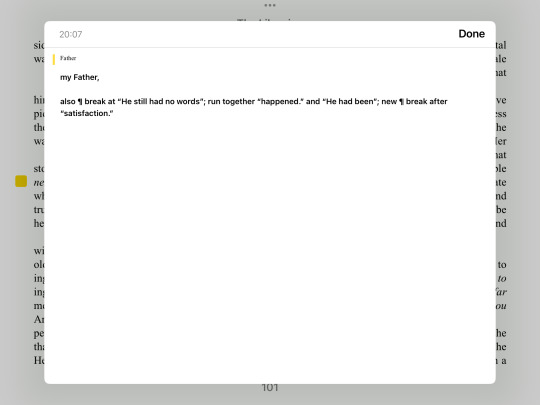
Then, when I'm finished looking over the previous day's/evening's writing and adding notes to it, I go downstairs, get some caffeine in me, and make the changes in the main Scrivener file. (If I was running the project in question on the iPad version of Scrivener, I'd just make the change right there. But who knows when I'd actually get up, then? Better to do it this way.) :)
In the normal flow of things I'll attempt to deal with a chapter or two a day in this mode. (Always bearing in mind that my chapters in early drafts typically run long—often 10K or so—and I'm likely enough to rebreak them later.) This first level of revision is the easy one: catching typos and bad or clumsy phrasings, reworking character interactions that need smoothing out; adding better descriptive passages (with particular emphasis on staying in the visual, audio and tactile senses), etc., etc.
So again: no way I'd ever bother worrying about word counts, with these. What seems to count for more is giving yourself time to recognize, gradually, at a reader's pace, what's working in the prose and what isn't. Rush—or try to force the pace to a given number of words per day—and you run the risk of missing something vital. To me, at the tracking level, it seems sufficient to note which chapters have been dealt with, and which are still hanging fire. (I can change the chapters' color labels in Scrivener to make this status visible at a glance, if I need to.)
When everything's dealt with on this pass—which if I'm lucky will take no more than a couple/few weeks—I try to take a couple weeks off before dealing with the MS again. Sometimes that's possible: sometimes not. The longer you can leave the book alone to let your perceptions of it rest and reset themselves, the better. Distance—mental or temporal—seems to lend clarity.
In any case, for me, next comes another pass, tougher to describe. Casually, I refer to it as the "Missed Opportunities/Complications" pass. This is a thing that one of the very best writers I know, John M. Ford, used to do. One of his editors (I think it was) came across him working on an MS one time, and asked him what he was doing. "Complications," Mike muttered. "Removing them?" said his editor. Mike shook his head. "Adding them," he said.
In this pass you look for in-novel connections you've previously missed making. Some dramatic moments have their impact significantly increased if you've found a way to connect them, even casually, with previous events, situations, character thoughts, or dialogue. (The cheap and easy mnemonic for this kind of thing: "Say a thing twice, and it echoes. Say it three times, and it resonates.")
Equally, events (and people) may turn out to require more complex backstory than you've given them in your first draft; so this is where you take care of that. And of course there are almost certainly character and emotional interactions that can use attention; fewer words, more depth, more complexity. What things do these people, in this situation, need to say to one another that they haven't? And also, what drama got scamped or passed up on because you were just too damn tired in the last draft? —Because you too, poor baby, are human; and that state can, entirely logically, make you want not to deal with any more damn drama just now. Even though drama is the lifeblood of your narrative, usually, and tying a tourniquet around it really doesn't help. You are the conduit of power into your narrative, and your varying ability to conduct it is always an issue… so you need to keep an eye open for places where the flow may have temporarily failed.
This pass, ideally, might take no more than another few weeks or a month. And again, I'm not sure any attempt at wordcount tracking would do this work any good. Because, again... are they the right words? And to make the narrative more effective, you may wind up removing as many words as you added in previous passes.
Finally, with all things taken together, I usually reach a point where (by myself, anyway) I can't think of anything to do that'll make this book any better. That's where there then comes—and again, impossible to assign a word count to it—a time when you know you're as Done As You Can Be. If you've been doing this long enough, you may even hear a strange kind of sigh in the back of your head, as the book gives up and lets go...
...into the next stage of production. But even then you keep an eye on it… because in my experience it’s rare that any book's ever that easily just finished. Even in page proofs, something may happen to surprise you.
Anyway, that's when I throw the book the hell out of the house—because no matter how much I've loved it previously, by that time I'm usually seriously tired of it—and wait to see whether the editor feels it needs one more draft. (Disclosure: this has never happened. There might be a few notes that need to be handled. But another full draft? Never yet.)
Anyway: hope this is of help to you.
But the heart of it all? Find your own way, and screw the bar graphs.
*That line, too, is an indicator of trouble to come. "It's?" Not "he's"? Tsk tsk.
**Usually sort of 7-9 AM. Sometimes way earlier, depending on the time of year. Dawn comes real early in the summertime in Ireland…
327 notes
·
View notes
Text
There’s no elegant way to express this thought without making anyone mad, but
I think some modern writing suffers from the delusion that a super-hyper-ultra strong version of the character is always the best one, and I think those stories are more boring for it.
I’ve more and more frequently run into stories where the main characters all go super-saiyan, and it’s treated not as an extreme, but as an obvious attainable and sustainable goal, when (in my humble opinion) it should not be either.
Not all characters benefit from being their strongest selves. Some characters are good BECAUSE they’re weaker. Some characters are interesting BECAUSE they’re average. Characters becoming the strongest version of themselves is cool sometimes BECAUSE it’s an edge of ability that is neither healthy nor realistic long-term.
If your only conceivable goal as a writer is to make all your characters reach level 100, you’re not writing a story. You’re scripting yourself a bar graph that is going to break the presentation, and overshadow all the other interesting things you can do with the rest of your quantifiers.
778 notes
·
View notes
Text
How to build a language self-study plan

So I’ve noticed, upon combing through pages and pages of youtube videos and google blogs, that rarely does anyone ever actually tell you what you should be studying. There’s a reason for this ! Everyone is different and at a different level, different motivation. It’s impossible to create a study plan that is perfect for everyone... which is why it can also be agonizing to make one for yourself.
“How am I supposed to know what’s important to study, if I don’t speak the language?”
Well that’s a good question! You need to gauge how far you’ve come so far and how far you’d like to get. It’s easiest when you are starting from zero because you can learn the alphabet, numbers, basic phrases, and basic grammar. Easy peasy. You can go cover to cover in a text book.
Here’s a check-list to create the perfect study plan special to you.
1. What do I know already? What do I need to work on?
- is it worth starting a textbook, if you feel like you already know half of it? It might be worth completing the given exercises and if you achieve an 80% or higher (or you could give that lesson to someone else) then you can move on from that specific point.
- create a list of the points that you still need to master
2. What do I need to include in a study session?
- naturally there needs to be a focus or a few different focuses of a study session, whether it’s a specific activity or a grammar point. I recommend creating a list of things you want to get done (a.) every day, (b) every week, and (c) every month. These goals must be quantifiable. For example, every week I read two news articles in German. As a reflection, I then write a summary of the event of the article as well as a personal opinion. That’s an easy box to check.
- you need a reflection. It’s important to really take time to reflect on how you feel about the time spent and the materials used. What could you do better next time? What went well?
3. When is the best time to study?
- are you more active/focused in the morning or in the night? The key is consistency. If you have a routine, you’re far more likely to adhere to it. I know that my own schedule is highly changeable and that can make it very difficult, but I’ve found if I wake up in the same period of time every morning, brush my teeth, make my bed, and then sit down to my work, I feel far more productive.
- how much should I study at a time? The recommended period is 25 minutes from the Pomodoro Method with a five minute break. You can research time-management techniques but ultimately it comes down to you.
4. How do I take notes ?
- IT”S ALL ABOUT YOU! What I do is take messy notes in classes or on my own and then I transcribe the finished page to my Notion page. It gives me a chance to make the notes neater and also to review a little bit. I will say though statistically, you will remember better if you write by hand.
- I like to have a column on each page for words I didn’t know
#languages#language learning#German language#french language#langblr#langblog#russian langblr#german langblr#french langblr#learn languages
1K notes
·
View notes
Text
Witchcraft Exercise - Annual Review

The end of the old calendar year and the beginning of a new one are excellent times for reflection and recalibration. We do this in our mundane lives by making resolutions, setting new goals, starting new projects, and sketching out our schedule for the coming year. So why not do the same with your witchcraft!
As a journaling exercise, sit down and record how your journey has progressed over the past year. You can include things like spells you’ve cast, rituals you’ve performed, holidays you’ve celebrated, gatherings you attended, new ideas you’ve encountered or incorporated, important lessons learned, and any significant milestones you’ve achieved. It doesn’t have to be fully comprehensive or bite-by-bite - the level of detail is entirely up to you.
(If you’ve already performed the exercise Quantifying Your Craft, then you already have a place to start. If you haven’t, I do suggest doing that first to give yourself a clear set of data and pre-determined information to reference.)
Once you’ve recorded your progress, decide where you want to go next. What new goals will you set? What new subjects do you want to explore? What habits do you want to alter or adopt? Are there any new books you want to read? Places you want to visit? New methods or techniques you want to try? Dream big and then sketch out a path to get you there, or just decide where you want to go next. And don’t worry about accomplishing everything on the list in the span of a year. Whatever doesn’t get done in the short term can always become the seed of something you grow into over time.
Of course, this doesn’t necessarily have to be an exercise that happens exclusively at the beginning or end of a calendar year. You can (and should) review and recalibrate periodically throughout the year whenever you incorporate new information or new ideas or new processes into your practice. This can be done as frequently or infrequently as you feel the need, whether that be monthly or quarterly or annually or just once every few years. Pausing for reflection is a necessary part of any long-term path or project, and it is a good way to both measure your progress so far and decide how best to move forward.
One more thing - Don’t be too hard on yourself or feel like you haven’t accomplished enough or learned enough or progressed enough to be a “proper” witch. Don’t compare your craft to anyone else’s or measure your viability by another's rod. Your journey is your own and will proceed at its’ own pace. Periods of rest or recovery or low motivation or preoccupation with other concerns are going to be part of that. As long as you’re making an effort, you’re doing just fine.
Happy Witching!
Image Credit - Witch Workspace, by Mylène Richard
Want more witchcraft exercises? Check out the masterpost here.
(If you’re enjoying my content, please feel free to drop a little something in the tip jar, tune in to my monthly show Hex Positive on your favorite podcast app, or check out my published works on Amazon or in the Willow Wings Witch Shop. 😊)
#witchcraft#witchblr#witchcraft exercises#witch tips#baby witch#pagan#advice for beginner witches#for all witches really
189 notes
·
View notes
Text
An Uncommonly Discussed Trauma Symptom

Disclaimer: This is in no way a substitute for therapy: it’s only psychoeducation. Please consult a therapist and/or hotline and get the help you need if you are experiencing mental health difficulties, especially if experiencing distress or issues that feel unmanageable.
Warnings: Mentions and discussion of suicidal ideation, death, abuse and violence.
Special thanks to @ashanimus and @childlikegoblinqueen
Ever heard of "the sense of a foreshortened future"?
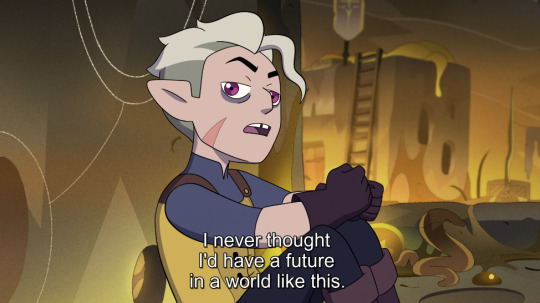
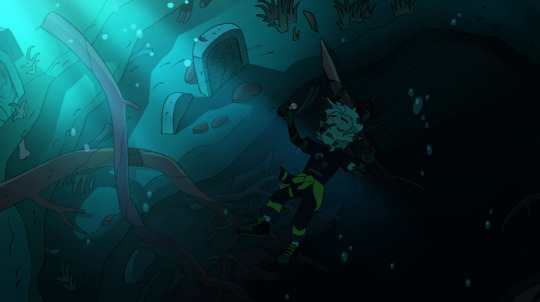
If you have suffered trauma over a sustained and long enough period of time, you may find that you can't imagine yourself living long. You can't see yourself reaching milestones, because it hardly makes sense to your mind that you can go on for that long...given how much you have felt like you've escaped danger, given just how many close calls you have had in life.
Yet the sense of a foreshortened future is a separate thing from suicidality.
If you have both of those together though, it really isn't fun because they may feed one another in a cycle, in the way that symptoms under the same mental health condition have the potential to do the same.
It isn't a desire for pain to end (which is what suicidality is), more so a generated expectation that takes root, and a framework which a survivor tries to fit their experiences into, with the goal to get things to make as much sense as can be. Because it's often the easier thing to devise a simple formula, to feel certainty and to manage one's expectations: rather than embrace the grey areas of uncertainty about how life will turn out.
It's almost as if this feeling of a foreshortened future is in a tug-of-war match between what appears to be solid reasoning, and a person's natural survival instinct along with the hunger for a meaningful life.

This symptom isn't on the *official* criteria for a psychiatrist or clinical psychologist to make any diagnoses, it is not listed in the Diagnostic and Statistical Manual of Mental Disorders, Fifth Edition (DSM-5) or International Classification of Diseases, 10th Revision (ICD-10). But informally it is sometimes categorized as an avoidance symptom under both PTSD and Complex PTSD, and also under longer-term depression.
(however, I think it can extend to other conditions. The key criteria is it emerges from repeatedly experiencing horrible things until it makes sense in one's head to expect themselves not to last much longer)
If you hop onto Google Scholar to find proper research about it, the findings are very scarce because it's hard to define it, empirically measure it and quantify it in the first place.
Again, it's not the same as suicidal ideation because a foreshortened-future view is an expectation, while the latter is about a desire.
I wasn't taught about this symptom in any training and supervision before becoming a licensed therapist, nor did any of my own therapists bring it up as psychoeducation when I saw them. It was only through online articles on informal websites that I stumbled upon the phrase and it all clicked for my long-term experiences.
But I feel it is good knowledge for anyone providing psychotherapy to bear in mind.
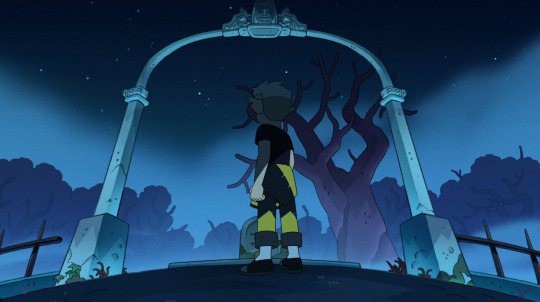
In The Owl House, the grimwalker lore weaved into Hunter's arc, can shockingly be linked with this symptom, symbolically and thematically.
But the show's age rating means it would likely be too dark for the writing team to explicitly incorporate it into Hunter's dialogue.
Hunter was a lamb marked for the slaughter early on.
He has questioned his survival and ability to thrive.
The following article on Psychology Today describes Belos's long-term influence on Hunter pretty well and provides info that strengthens the points I'm making in this whole post:
Link
It's bad enough that before Hunter and Luz found Belos's mindscape, he struggled with the fear of failure to the extent that there was already the raging inner battle between his primal survival instinct and the already knackered part of him that sought eternal rest from his suffering (showing up as suicidal thoughts):
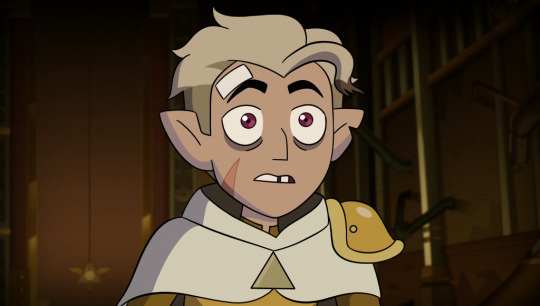

Fast forward a number of episodes...and we see the looming horrors in Hollow Mind that culminated in Hunter's discovery of what his predecessors went through:

followed by permanent rejection by his parental figure:
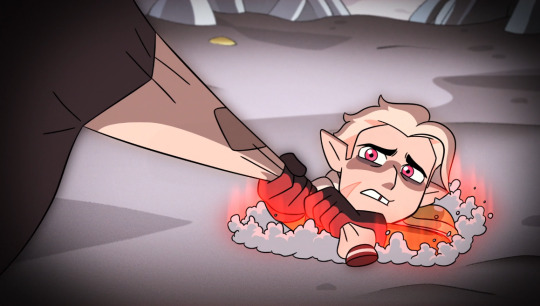

The power held by a foreshortened-future view, and its potential to isolate you - to make you feel like you're invisible, or a ghost - can be strong.
What Hunter said to Gus in the following screencaps sums up what it feels like pretty well:


In the context of having an abuser, it emerges from the negative beliefs they impose on you. It gets tricky if those beliefs are internalized, and which may remain internalized even after you get to safety and away from said abuser. Internalized until they become what you expect of your life.
It's about those thoughts which you know in your rational mind are lies, but you feel their apparent truth. They go more silent when you practice self-care but they return to try and reel you in again, and to a degree, they succeed in getting you to believe them all over again, before you renounce them once more.
Being in the C-PTSD Club along with Hunter, I personally experience the feeling of a foreshortened future as a voice deep down which almost always says that life feels too long and it therefore feels absolutely weird, like it doesn't make sense. Life feels too long, contrary to that commonly heard cheesy quote, "Life is too short to blah blah blah".
When I reached milestone birthdays like my 21st, it was confusing and made me irritable, feeling an itch deep down that I could not scratch.
The voice asks me why the heck I'm still around when it apparently doesn't make sense. It's a pervading feeling which can be pretty annoying, though I have it far enough in the background that it's like noise instead of being a source of distress.
It's not the easiest thing to explain this, but Hunter may have confusing thoughts creeping into his head like "Caleb didn't last long, why would I?" whereby such thoughts have a strange feel to them. They aren't exactly hard rules, nor are they distant enough that they can be easily brushed aside. Brain hurty, emotions spooky.
After the horror of this night:
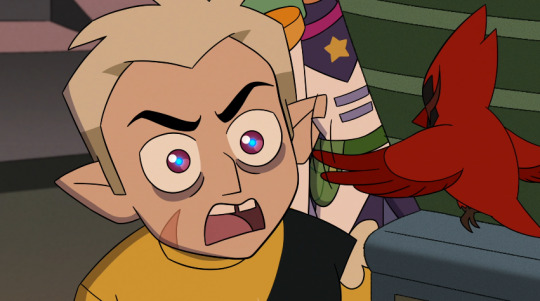
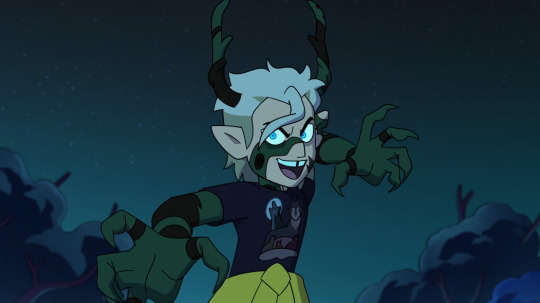
I can definitely see Hunter wrestling with this symptom from time to time. No doubt. It was a major loss of autonomy and control that would significantly aggravate what was already brewing deep down.
I'm doubtful that the crew even established this on purpose (unless they actually consulted trauma experts and/or experienced mental health practitioners), but...this one symptom ties in with grimwalker lore so perfectly...it's hella fascinating that all Hunter's predecessors' lives (including Caleb's) were cut short. Prematurely.
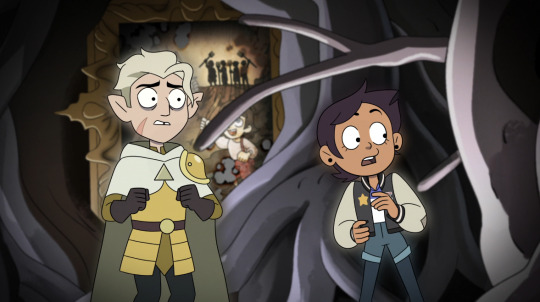
They came with an expiry date set by their abuser: something very characteristic of this foreshortened future feeling, though not unique to survivors of abusive home environments (e.g. if you experienced natural disasters over many years, yet had a loving family, you could also feel like you may not live long). And Hunter's experience of seeing the grimwalker graveyard in Hollow Mind is a shockingly visceral and visual metaphor to symbolize a concept like this, which matches perfectly with his symptomology as a Complex PTSD survivor.
The battle for inner peace has a high price: it is ongoing, and extends beyond him being physically free from Belos. Because Hunter can't just trim away the Belos-related memories from his earliest years and formative years. He can't forget, but he can choose to give those memories less attention, and choose not to let them take the steering wheel in the long-term.
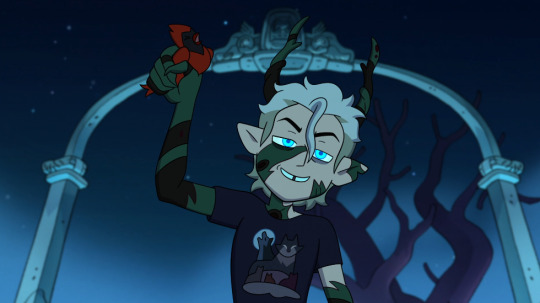
In my opinion, the possession scenes don't just portray the physical experience of an abuser returning to try regaining control or restoring the status quo of having the survivor in their grasp.
The scenes also represent the abuser's imprint upon the survivor that lasts beyond the duration for which Belos is present in Hunter's life. Belos is the kind of abuser that is so insidious that he knows he could leave some marks that outlast his directly physical presence, in the event that he meets his own end. He would have definitely thought about this. Leaving the kind of grisly reminders that won't ever technically fade away (not to be confused with how they can certainly "fade further into the background" via therapy, new positive experiences and the support of loved ones).
For example, the patterns of the permanent scars on Hunter look so much like the patterns on Philip's own face and body. When possessed, the markings were dark green, later faded to the colour of scar tissue once Belos leaves his body.
As we all know, it's hella sad to imagine Hunter having to look at himself in mirrors throughout the rest of his life. It was awful enough that he had the haircut-related panic attack.
If we tie all that back to the symptom of a foreshortened-future view: Hunter might be left with a spooky nebulous feeling (that will alternate between coming back to haunt him, and subsiding) that he too has some expiry date that is different from how the people around him naturally and confidently expect to live a substantially long life. As a cult survivor with C-PTSD, Hunter can't afford the luxury of those natural expectations.
I don't mean that he might plan a day in the future to end his own life, not at all. But he may have a strange ghostly expectation of how long more he has till his life may come to an end, and he wouldn't be sure of how this subconscious expectation came about.
The darker days of navigating the confusing mess of his complex trauma may feel like exhaustion from paddling and swimming to keep your head above water to breathe.
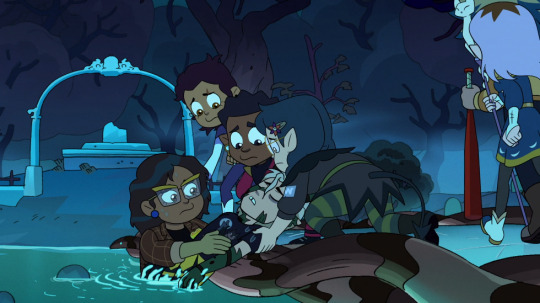
Speaking of water and drowning, plus the theme of sinking down vs. rising back up above the water surface...the fact that Camila jumped in to bring him back up, his friends helped to pull him out, and Flapjack passes new life to him...this is also some crazy powerful symbolism for surviving complex trauma.
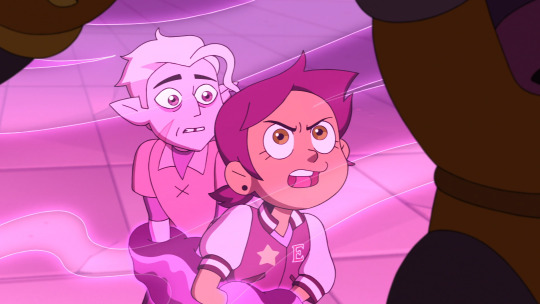
Falling back on a support network, your "tribe", that won't abandon you.
My other Hunter analyses (link) go into more detail about his support network and why he needs it.
I was talking to a friend about all this: she has relevant lived experience and mentioned that poor Hunter would reach a milestone birthday and perhaps cry at least a bit on that day, maybe even during the birthday party: out of sheer confusion. The confusion would be silently screaming "But...this doesn't...make sense?". And he might feel confusing waves of darker emotions along with a strange sense of joy.
He may make a decision to start a family with Willow, and a confused questioning voice will bother him now and then with "How are you still here, doing this and living to see this?".
(...also, when is his birthday...? Is it documented in some Emperor's Coven records that they will find..? Even the mere concept of having a birthday is messed up for him to think about, given the purpose behind his creation)

Complex trauma changes its survivors' relationships with the world, not just with people, and this can even apply to their relationships with things like joy and how joy is experienced.
Flapjack's absence would have bred survivor's guilt. It might translate into Hunter questioning whether he is worth the love and effort his friends put in for him. This feeling could emerge at random moments over the years in his life.
Visually, I feel that these two frames - the lighting (which I'd say is unique among all his scenes because they are parts of his arc that stand out so much), his pose, his expression - somehow capture the experience of how complex trauma is chronic and long-term:

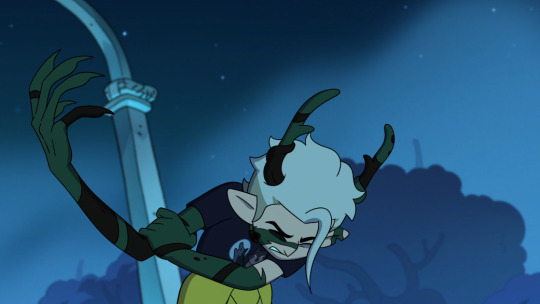
The currently most known C-PTSD memoir out there, What My Bones Know by journalist Stephanie Foo, has some content that I feel matches nicely with what Hunter is experiencing in the two separate scenes above.
The author describes something she calls "the dread" (if you get the book, it's first mentioned on page 51). I would call it the amalgamation of multiple things such as shame, the fear of impending harm, self-doubt where you question whether you did something wrong, fearing that someone hates you, etc.
And basically, good lord my poor boy in the first screenshot..with that expression of suspecting what he thought was Belos's presence in the room: something about it fits the book author's words, feeling like she was "on the precipice of fucking everything up".
That's certainly something that would cross Hunter's mind multiple times as he processes the worst night of his life. That he could have done something to prevent all that.
With so much pre-existing worry that his friends and family might actually hate him, the possession scenes and Flapjack's death would definitely shake his foundation and I'm sure he isn't past this kind of ingrained thought pattern at all:

Second, the book author calls C-PTSD a shapeshifting "beast" (page 316). And when she fights it, she must use a different strategy depending on what form it takes, and that it will keep coming back from time to time in another form. Which is why there is a particular exhaustion one feels from having to adapt to each battle.
For Hunter, the second screencap of him fighting Belos's coercion in a direct physical manner is the first of many battles he has to win in his mind, even after Belos is gone for good. Outlasting whatever invisible assailant is trying to get him, as he faces inevitable episodes of being retraumatized in the future: these are called emotional flashbacks (one of the symptoms of C-PTSD).
Being a survivor of complex trauma who experiences a weird sense of time via a foreshortened-future view, can feel like being on the outside looking in.
But! To end this meta on a hopeful note, I should reiterate something from my most recent long meta about Retraumatization vs. Self-Soothing, the first part of Hunter's important speech in Thanks to Them touches on wild magic and palisman. Wild magic represents freedom, while palismen (quoting the Bat Queen) represent close bonds in relationships, emotion, and conviction.
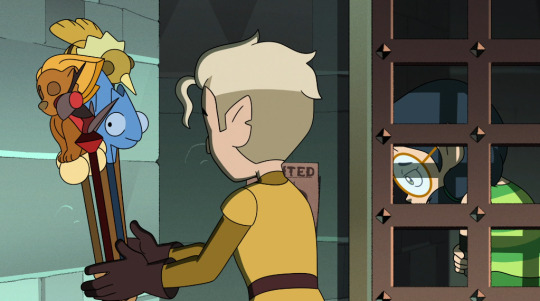
Applying this to how we can navigate the swampy waters of a foreshortened-future view, Hunter can use his newfound freedom and sense of agency to create the story he'd like to tell about his life. It is pretty much impossible to avoid bringing beliefs from our young formative years into adulthood. But expectations (which have a direct link with emotions we end up feeling) of ourselves and of life can be altered over time, so they become less rigid and instead more open to new possibilities.
He has an inquisitive mind which is a big plus point in understanding the impact of what he has been through, and I have full faith that he'll do just fine in that regard because of the courage we have seen in him.
Among the hobbies he explores in the future, flyer derby will be one example of an excellent outlet for him because of its physicality: trauma and grief are not only emotional battlegrounds but also highly physical ones. The body is also very much involved e.g. feeling the lead-like weight of depressive moods in one's body, feeling the physical tension of hypervigilance, etc.
It's fantastic that he has Luz, Willow, Gus and company, he will have a very meaningful career, and he'll have everyone else in his large found family.

His story...his heart...his resilience and vitality...it's all truly inspirational.
We might learn even more about the grimwalkers in the finale and that would undoubtedly prompt me to do a shorter Part 2 on top of this meta.
527 notes
·
View notes
Text
Femme Fatale Guide: How To Overcome Imposter Syndrome & Perfectionism
How To Overcome Imposter Syndrome:
Keep Your Ideal Self Top of Mind: While you can't ever truly "fake it until you make it," it is essential to cultivate the belief that can act in accordance with your ideal self. Consider what the ideal version of yourself would do on a daily basis: What would your morning routine/night routine look like? How would you prioritize tasks or activities throughout your day? What would you consider your metrics for a successful project, task, social interaction, or professional activity? How would you describe a productive day, week, or month? Qualify and quantify these ideal metrics to give yourself a blueprint to move forward toward your goals and become the best version of yourself.
Competence Builds Confidence: Remember that the notion of an "overnight success story" is a fallacy. Quickly-awarded achievements, seemingly effortless skill sets, or having the perfect script for every occasion typically stem from hours or years of practice, experiences, studying, self-development, and trial and error. Over time, you refine these crafts until you can consider them as strengths. This inner knowing gives you the self-assurance needed to truly believe in yourself and it's contagious in your work, speech, and body language. Competence radiates inner confidence, without a question.
Remember Everything Is Relative: Logically, we know that comparing the middle of someone's journey to the beginning of yours doesn't make any sense. While it can be intimidating to enter the ring as a beginner, remember that the most skilled and successful people you know were at one point at square one. The only way to catch up to those you admire is to make an effort in the first place. However, because you're a beginner, give yourself some grace and remember that making mistakes is part of the learning process. It is better to fail in the beginning before people have certain expectations of you. But, the truth is, no one truly knows what they're doing. More time existing and life experience only helps us make better judgments to more accurately assess the proper next move.
Perceive Attempts As Data: Success is all about pattern recognition. See what "inputs" derive certain "outputs." Some attempts – at a certain career path, academic concentration, interpersonal interactions – will be advantageous with many that are neutral and some that go sour. Do not allow an unanswered email to a pitch, a lower grade on an assignment, or an ending of any type of relationship to feel like a moral failure and as a marker of your worth (personally, professionally, etc.). Evaluate what you did correctly and seek out areas for improvement. The more attempts you make, the more data you collect in order to help you make accurate assessments going forward. Consider this your motivation to start.
Accept Failures As Life Lessons: Failures offer a unique opportunity for self-reflection and course correction. Consider the mistakes that lead you to a negative outcome or the unfavorable circumstances you entered into (e.g. not studying for a test or already seeing red flags during the job interview). Use these opportunities to refine your strategies to succeed. While failures might not be inherently positive in the short term, failing fast saves you a lot of trouble along the way.
How To Overcome Perfectionism:
Find Stupidly Small Ways To Start: Write the title on a document and some keywords you want to use; Write an introductory sentence to an email; Place the first photo on the collage; Mix the spices together for a dish –literally anything to get you started on the task at hand. Give yourself a small push to gain momentum to keep going.
Set A Timer: Gamify any task by making it a race against the clock. Set a timer for 10, 20, or 30 minutes to see how much you can get done with a short spurt for hyper-focus. Focus on output, not outcomes when using this method. Remember: You can always go back and edit a project or refine the details of a space, meal, or task after. You will probably surprise yourself with how much you get done and how quick it is to elevate the standard of any timed work.
Consider Consequences of Delayed Action: Procrastination is perfectionism's greatest frenemy. The quicker you are to begin a task or strategize how to initiate a conversation, the more likely you will be to make it happen and give yourself the brain space to mull over the ideas before sharing the final product. Shitty first drafts of anything in life are welcomed. You can always edit later before finishing or showcasing something you want to take pride in. A step forward gives you guidance toward the right path. A step backward provides insight into how to strategize to win in the future. The only guaranteed way to never achieve greatness in a certain area of life is to not start in the first place.
#healthy habits#imposter syndrome#perfectionism#successhabits#femme fatale#dark femininity#dark feminine energy#it girl#queen energy#dream girl#self improvement#self development#higher self#high value woman#high value mindset#productivity#procrastination#study tips#career advice#life lessons#life advice#that girl#female excellence#female power#femmefatalevibe
578 notes
·
View notes
Text
If you want to step into that let’s-fucking-go energy and eat this week alive then here’s a few steps to activate that fire in your belly so you’re heated, motivated and fuelled for a winning week ahead.
1] Listen to some motivation. Literally 10 mins while you’re making your breakfast, walking the dog, even in the shower. Go play something positive to get your mind activated. I recommend P Diddy (I listened to this today), Old Kanye West, Gary V, Chanel Ritchie, Eric Thomas, Jim Rohn, Joe Rogan, but find someone who speaks to your soul and gives you that let’s-fucking-go motivation.
2] Get a list together so you can stab through those tasks. Write the time it will take to do each one, so you can see how easy it is to achieve what you need to in a short amount of time. For example a 10 min YouTube meditation. 5 mins writing goals, 15 mins breakfast, 10 mins quick shower and get dressed, 15 mins yoga stretches. In under an hour you could have achieved so much.. see how quantifying your schedule shifts things?
3] Focus on your move-the-needle tasks as an absolute PRIORTY. This is the task that is above everything else. That is going to get you to where you want to be. For example if you want to write a book, or become a content creator. Literally DO the thing that is going to move you forward TODAY. And the sooner in the day you get it done the better.
These are some simple things that have been helping me. Since I quit scrolling and moved into action I feel more energised, more present and overall more happy. Gone are the days I feel shit for not doing what I promised myself.
#manifestyourreality#levelup#lawofattraction#levelupjourney#manifesting#growthmindset#levelup confidence lawofattraction powerofthemind#manifestingmindset#manifest
101 notes
·
View notes